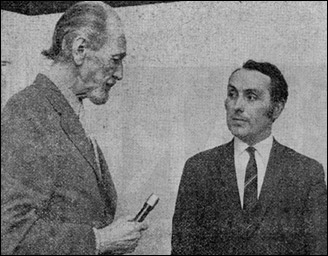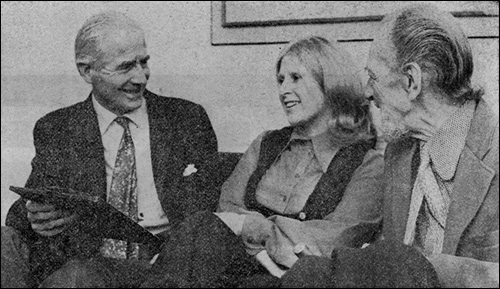| Introduction
In 1973, at the suggestion of the then Rector, the Rev Derek Hole, an application was made to the BBC to feature the completed restoration of the church. “We had hoped to get the television authority interested but unfortunately the aisles of the church were not wide enough to allow the cameras inside. Then the “Down Your Way” programme said they were interested,” he stated.
The programme was scheduled to go on the air on Sunday, January 28th in a Radio 4 broadcast from 5.15pm to 5.55pm, with a slightly extended version was for the following Wednesday, January 31st, at 7.30pm.
Mr. Hole himself was interviewed along with Mr. Douglas Ashby, chairman of Burton Latimer Urban Council, and Mr. Richard Harper of Burton Hall. Other people featured were Mr. Ian Roberts, managing director of Roberts tie factory, Mr. Roy Richards, marketing director of Weetabix, Mr. Angus Westley, managing director of shoe firm Whitney and Westley, and Mrs. Pat Turner, local hairdresser and social worker with the WRVS. After each interview, a record chosen especially by each person interviewed was played. Mr. Ashby commented: “We are looking forward to this very much. It is a good thing for Burton Latimer and should really put the town’s name on the map.”
The Recording
Report from the Kettering Evening Telegraph, Thursday January 25th, 1973
“Down Your Way” in Burton Latimer
A buzz of excitement was in the air this week as the national spotlight fell on Burton Latimer for the first time in the town’s long history.
On Tuesday and Wednesday this week many locals were awaiting the arrival of a BBC team for the recording of a programme in the fames “Down Your Way” programme for Radio Four.
Half-expecting a giant team of technicians and producers, we waited outside the home of hairdresser Mrs. Pat Turner who was to be interviewed about her social work as treasurer of the Burton Latimer branch of WRVS.
And it wasn’t long before a car drew up and three men got out, one with a batter-operated tape-recorder. “We are from the BBC,” they said.
Trendy gear
No large van, no masses of wire and microphones, no masses of people and electronic equipment – even Mrs. Turner was a little surprised ( her husband assured her the producer would be a scruffy little man wearing trendy gear.)
There were just three men, producer Richard Burwood, technician Alex Henderson and that giant Scot Fyfe Robertson - the victim of so many television impressionists.
“It’s really quite amazing how many people expect us to be something completely different,” said Richard, who has been with the BBC for 20 years and producing “Down Your Way” for the past five.
“You know, there are still people who give us the television image, expecting big BBC vehicles to draw up but it is all very basic – all we have is a simple two-track tape-recording and questions to ask.”
Mr. Burwood said when the programme first began about 22 years ago, it was largely influenced by its compere Richard Dimbleby who at that time did have a backing team of about ten people.
Simpler
Recordings then were really on the spot with voices put straight onto discs which we then played to the nation.
Mr. Burwood came to Burton Latimer about two weeks ago to get to know the town and its people and chatting to many locals over a drink to get the “feel” of the place.
He then returned with his “crew” on Tuesday afternoon to carry out a series of interviews with locals thought to represent a good cross-section of people in the town.
“We finished by Wednesday dinnertime, go back to London, the tape is edited ready for broadcast on Sunday – as easy as that!”
Fyfe Robertson who was standing in for Brian Johnston, said that his was the easiest job of all. All he had to do was carry out the interviews which are about four minutes to each person.
Fyfe interviewed the rector of Burton Latimer, the Rev Derek Hole, Mr. Ian Roberts, managing director of Roberts tie factory, Mr. Richard Harpur of Burton Latimer Hall, Mr. Roy Richards, marketing director of Weetabix, Mr. Angus Westley, managing director of shoe firm Whitney and Westley, and chairman of Burton Latimer Urban Council, Mr. Douglas Ashby.
The programme goes on the air on Sunday at 5.15pm with an extended version the following Wednesday at 7.30pm. “It may be a bit old-fashioned,” said Mr. Burwood, “But it is still a very popular programme – it gets about two million listeners a week.”
|
 |
|
Fyfe Robertson interviews Douglas Ashby
|
The Broadcast
The "Evening Telegraph" published an article, headed "Where The Folk Are So Friendly" in its edition of Monday, January 29th. The main points are given below:
Burton Latimer – a neighbourly place where the community cares about the welfare of its people. That was one of the descriptions Fyfe Robertson gave to millions of radio listeners yesterday.
Introducing Radio Four’s popular programme, the Scottish interviewer made a tour of the town, investigating its history, industry and people. He said it was a pleasant industrial town with a growing number of newcomers and virtually no unemployment.
While talking to hairdresser, Mrs. Pat Turner, Fyfe found that Burton Latimer’s elderly people were more fortunate than most. Mrs. Turner said that pensioners were very well looked after by health visitors, doctors and district nurses, and the WRVS Meals on Wheels service, of which she is treasurer.
Mr. Douglas Ashby, chairman of Burton Latimer Urban Council and a keen historian told listeners that the town had Roman origins and that industrialization did not begin until the middle of the 19th century.
Two of the town’s industries were spotlighted, Weetabix, the cereal manufacturers and shoe firm Whitney and Westley, Mr Angus Westley, managing director of the latter, said that 6,000 pairs of mens shoes were made at his factory per week and that 60 per cent of the 250 staff were woman.
Mr. Ian Richards, managing director or Weetabix said that his company, established in 1932, had doubled its output in the past ten years despite competition from American owned companies.
The rector of Burton Latimer, the Rev Derek Hole, was described by Fyfe Robertson as a “young and very with-it parson”. Mr. Hole showed Mr Robertson around the church of St. Mary, pointing out its restored paintings and decorative frontal depicting local industry.
Also interviewed was Mr. Richard Harpur of Burton Hall. Mr. Harpur, the present day “Lord of the Manor” in Burton Latimer spoke of the 200 year history of his house which was recently restored to keep its former Jacobean appearance.
|
The Reaction
The contents of the programme provoked controversy in the town, and within a week the "Evening Telegraph" was reporting complaints of bias.
Criticism centred around the choice of interviewees, and the claim that they were a “completely unrepresentative” cross-section of residents, most of them being either company directors or managers, and some did not even live in the town.
|
Mr. Les Judkins of 1, Nene Road, Burton Latimer, wrote ironically:
“The interviewees were the life and soul of Burton. So much so that the majority of them found it difficult to actually live there because of their undoubted popularity. The BBC team must have gone away from Burton impressed by the fact that we were, for the most part, company directors and managers. In fact, we were not really represented at all."
“Was one of the many friends who have settled here from London interviewed? Were any of the many, many ordinary workers of all trades and professions, who also live in Burton, allowed to creep through the screen along with any of the real characters, who abound here? It doesn’t appear to be so.”
|
Mr. Judkins also claimed that had it not been for the report in the “Evening Telegraph,” probably 95 per cent of the population would not have known anything at all about the visit.
In reply to the criticisms, Mr. Douglas Ashby, chairman of Burton Latimer Urban Council, who supplied BBC producer Mr. Richard Burwood with names of possible interview subjects, said: “We were only allowed seven interviews and this is very limiting. But under the circumstances, I think we gave a pretty good “cross-section” of the industry in Burton.
“After all, it’s no good interviewing an ordinary worker. What could they say about a firm? It has to come from managerial level.”
He added: “I’m not surprised at this criticism. You always get people who say they should have been included. It is true that certain of the directors live outside the town, but they run businesses in Burton Latimer and their families have always lived there.”
Members of the BBC team who recorded the programme were unavailable for comment.
|

